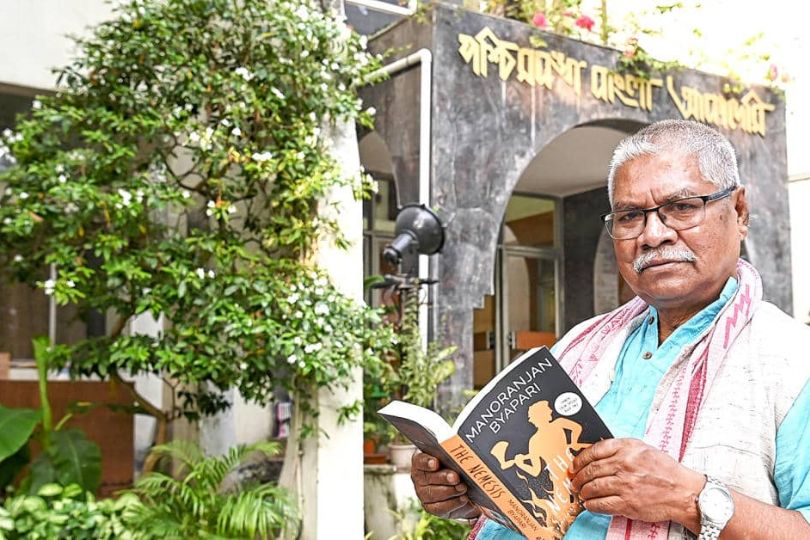Manoranjan Byapari, Author, Discusses bringing the Genuine Picture of Dalit Literature to Light
Explore Dalit rights advocacy through the impactful writings of Manoranjan Byapari, MLA, and chairperson of West Bengal Dalit Sahitya Academy, at Paschimbanga Bangla Academy.on Nov 17, 2023

Author and MLA, who is the chairperson of West Bengal Dalit Sahitya Academy, has used his writings to advocate for the rights of Dalits.
We bypassed the red tape of MLA Hostel on Kyd Street and went straight to Paschimbanga Bangla Academy near Rabindra Sadan, where Manoranjan Byapari felt more at ease. In simple and honest words, the author and MLA, who is the chairperson of West Bengal Dalit Sahitya Academy, has championed the cause of Dalits via his writings - essays and books.
Byapari, whose life story is equally compelling, writes in Bengali, and each of his novels provides the reader with insight into the life, challenges, and daily struggle of the disadvantaged part. His novels also portray the sorrow of a deprived society, which was obvious when we sat down in one of the academy's rooms to discuss his novel, The Nemesis. The Nemesis is part of his Chandal trilogy and an expansion of his memoir Itibritte Chandal Jibon, which received The Hindu Prize and was translated into English as Interrogating my Chandal life: An Autobiography of a Dalit. It is also on the shortlist for the JCB Prize for Literature.
On November 18, the winner will be announced. Byapari spoke candidly with The Telegraph while dressed in his typical short kurta and trousers with gamcha.
You're no stranger to the JCB Prize for Literature. Your third book on the list in the last three years is The Nemesis. Has translation impacted your writing or thought process since it has widened literary boundaries for you and thrust you into the mainstream?
These novels were written several years before I met JCB. I never write while swayed by a prize. Literary accolades followed when Westland reviewed my books and reached an arrangement.
Perhaps the influence or recognition that I am writing for a larger audience will come now, when I discuss my Bidhayak jibon. Winning isn't essential to me, but everyone else on the list does.
The second novel in the Chandal Jibon trilogy is The Nemesis. Are you finished with the last installment?
Yes, the book has already been translated and submitted.
Your first multi-series novel is Chandal Jibon. What distinguishes it from creating standalone novels?
The plot revolves around a person's life, but life changes every week, month, and year. One incidence follows another; one fight follows another; and every time a new ecology is formed, a new life is born. As a result, all of this could not be contained in a single book. As a result, I had to resort to a trilogy to convey the story thoroughly.
When did you decide to make it a trilogy?
I used to write three tales for a publication every year, and then I stopped. It concluded with the character being imprisoned. However, the publishers recognised that the stories were not fiction but rather my actual stories, and they encouraged me to write a memoir.
Itibritte Chandal Jibon is a 1,000-1,200 page book that chronicles my life up to 2021. This is unquestionably a continuation of my story, as it continues beyond 2021 and discusses the new life that I have led. To write that much and keep readers' attention spans in mind, it had to be separated into many books. However, Itibritte Chandal Jibon is not the same as the Chandal Jobon trilogy. A novel allows for greater creative licence than a biography that follows a strict timeline. The novel depicts many persons who are related to me or have come into contact with me.
Which of the three books in the trilogy was the most difficult?
All three were difficult for me because they were about one person's story, not three different situations or characters. Many individuals have written about us, but they are unfamiliar with our position and life. Many people depict jail sequences in films, but the reality is distant from what is depicted on the screen. My life experience has been completely different.
Your firsthand experience informs your writings on Dalit literature. How do you believe you've grown as a writer?
I write about a subject that I am quite familiar with and have had personal experience with. I don't rely on my imagination. Whatever I have seen and am witnessing, I write about it honestly.
This is not my profession; I held the pen because there were things inside me that wanted to be expressed. I am not literate enough to appreciate the complexities of writing, but the truth is so powerful that fiction fails. People have asked me if what I've written is accurate because it's difficult to believe. I remember being about to be tossed into a river and being able to write about the flow of feelings that I would be dead in a few minutes because I had experienced it. This cannot be imagined and then written. Fiction writers may be able to pull it off, but it will not sound whole.
What were your intentions when you picked up the pen?
My goal was to tell the tale of a group of people who struggle every day for a single meal, battling to buy a piece of bread for 17 paise, the same price as a block of brick. Then there's the other group, which is obnoxiously wealthy and wants even more. Why, despite my efforts, am I unable to live with decency and respect? Why can't I access medical care despite living in the same country as the wealthy? Why don't I have money when others do? This is my frustration with the system.
You are the president of the West Bengal Dalit Sahitya Academy. How do you promote Dalit authors and literature?
Our writings are not published and are not trusted. As a result, we, as a government organisation, publish Dalit writers' writings in order to promote them and bring to light writings that would otherwise go unnoticed. We hold a four-day Dalit Sahitya Utsav in several districts and award nominal prizes to the winners. We shall now investigate Jharkhand for the same reason. Dalit Sahitya is not Manoranjan's sahitya, but rather a movement and an endeavour to raise public awareness.

.jpg)
.jpg)
.jpg)
.jpg)
.jpg)

.jpg)
.jpg)
.jpg)
.jpg)
.jpg)


.jpg)

.jpg)










Sorry! No comment found for this post.